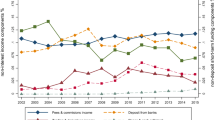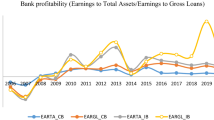Empirical Research in Islamic Banking: Past, Present, and Future
- First Online: 18 October 2016

Cite this chapter

- Nafis Alam 5 &
- Syed Aun R. Rizvi 6
Part of the book series: Palgrave CIBFR Studies in Islamic Finance ((PCSIF))
1103 Accesses
5 Citations
Islamic banking is an emerging research theme in banking-related studies that can be further expanded owing to a dearth of extensive studies in this field. A major part of the literature contains a comparative analysis of Islamic banking and its conventional counterparts, based on performance and regulatory theme. The aim of this chapter is to demonstrate the extraordinary potential and depth of current and future research theme in Islamic banking domain. The chapter discusses the areas and issues that have been covered intensively in the recent literature, and also helps to identify the areas that have received relatively less attention. Finally, it also points to the newest areas of research that seem promising for future research in Islamic banking theme.
This is a preview of subscription content, log in via an institution to check access.
Access this chapter
Subscribe and save.
- Get 10 units per month
- Download Article/Chapter or eBook
- 1 Unit = 1 Article or 1 Chapter
- Cancel anytime
- Available as PDF
- Read on any device
- Instant download
- Own it forever
- Available as EPUB and PDF
- Durable hardcover edition
- Dispatched in 3 to 5 business days
- Free shipping worldwide - see info
Tax calculation will be finalised at checkout
Purchases are for personal use only
Institutional subscriptions
Similar content being viewed by others

Banking in Italy

Empirical evidence on bank market power, business models, stability and performance in the emerging economies

Bank performance before and during the COVID-19 crisis: Does efficiency play a role?
Abedifar, P., Molyneux, P., & Tarazi, A. (2013) Risk in Islamic banking. Review of Finance , 17 , 2035–2096.
Article Google Scholar
Ahmad, S., & Abdul-Rahman, A.R. (2012). The efficiency of Islamic and conventional commercial banks in Malaysia. International Journal of Islamic and Middle Eastern Finance and Management , 5 (3), 241–263.
Ainley, M., Mashayekhi, A., Hicks, R., Rahman, A., & Ravalia, A. (2007). Islamic finance in the UK: Regulation and challenges. London: Financial Services Authority.
Google Scholar
Alam, N. (2012a). Efficiency and risk-taking in dual banking system: Evidence from emerging markets. International Review of Business Research Papers , 8 (4), 94–111.
Alam, N. (2012b). The impact of regulatory and supervisory structures on bank risk and efficiency: Evidence from dual banking system. Asian Journal of Finance & Accounting , 4 (1), 216–244.
Alam, N. (2014). Regulations and bank risk taking in dual banking countries. Journal of Banking Regulation , 15 (2), 105–116.
Al-Khasawneh, J.A., Bassedat, K., Aktan, B., & Thapa, P.D.P. (2012). Efficiency of Islamic banks: Case of North African Arab countries. Qualitative Research in Financial Markets , 4 (2/3), 228–239.
Azmat, S., Skully, M., & Kym, B. (2015). Can Islamic banking ever become Islamic?. Pacific Basin Finance Journal , 34 , 253–272.
Beck, T., Demirguc-Kunt, A., & Merrouche, O. 2013. Islamic vs. conventional banking: Business model, efficiency and stability. Journal of Banking and Finance , 37 , 443–447.
Belanes, A., Fitti, Z., & Regaieg, R. (2015). What can we learn about Islamic banks efficiency under the subprime crisis? Evidence from GCC region. Pacific-Basin Finance Journal , 33 , 81–92.
Cihak, M., & Hesse, H. (2008). Islamic banks and financial stability an empirical analysis . Washington: International Monetary Fund.
Daher, H., Masih, M., & Ibrahim, M.H. (2015). The unique risk exposures of Islamic banks’ capital buffers: A dynamic panel data analysis. Journal of International Financial Markets, Institutions and Money , 36 , 36–52.
Dusuki, A. W., & Abdullah, N. I. (2007). Why do Malaysian customers patronize Islamic banks? International Journal of Bank Marketing , 25 (3), 143–160.
El‐Gamal, M.A., & Inanoglu, H. (2005). Inefficiency and heterogeneity in Turkish banking: 1990–2000. Journal of Applied Econometrics , 20 (5), 641–664.
Farook, S., Hassan, M. K., & Clinch, G. (2014). Islamic bank incentives and discretionary loan loss provisions. Pacific-Basin Finance Journal , 28 , 152–174.
Gishkori, M.A., & Ullah, N. (2013). Technical efficiency of Islamic and commercial banks: Evidence from Pakistan using DEA Model (2007–2011). IOSR Journal of Business and Management , 7 (4), 68–76.
Hassan, T., Mohamad, S., & Bader, M.K.I. (2009). Efficiency of conventional versus Islamic banks: Evidence from the Middle East. International Journal of Islamic and Middle Eastern Finance and Management , 2 (1), 46–65.
Jobst, A. (2007). The economics of Islamic finance and securitization . IMF Working Paper No.07/117. Washington: International Monetary Fund.
Johnes, J., Izzeldin, M., & Pappas, V. (2014). A comparison of performance of Islamic and conventional banks 2004 to 2009. Journal of Economic Behavior and Organization , 103 , S93–S107.
Khediri, K.S., Charfeddine, L., & Youssef, S.B. (2014). Islamic versus conventional banks in the GCC countries: A comparative study using classification techniques. Research in International Business and Finance , 33 , 75–98.
Kristo, S., & Gruda, S. (2010). Competition, efficiency and stability in Albanian banking system. Journal of Academic Research in Economics , 2 (3), 281–296.
Mallin, C., & Farag, H.O.-Y. (2014). Corporate social responsibility and financial performance in Islamic banks. Journal of Economic Behavior and Organization , 103 , S21–S38.
Olson, D., & Zoubi, T., (2008). Using Accounting Ratios to distinguish between Islamic and conventional banks in the GCC region. The International Journal of Accounting , 43 , 45–65.
Pollard, J., & Samers, M. (2007). Islamic banking and finance: Postcolonial political economy and the decentring of economic geography. Transactions of the Institute of British Geographers , 32 , 313–330.
Rosman, R., Abd Wahab, N., & Zainol, Z. (2014). Efficiency of Islamic banks during the financial crisis: An analysis of Middle Eastern and Asian countries. Pacific Basin Finance Journal , 28 , 76–90.
Sahut, J.M., Mili, M., & Krir, M.B. (2011). Factors of competitiveness of Islamic banks in the new financial order. Working Paper.
Shanmugam, B., Perumal, V., & Ridzwa, H.A. (2004). Islamic banking: An international perspective . Kuala Lumpur: University Putra Malaysia Press.
Sole, J. (2007). Introducing Islamic banks into conventional banking systems. IMF Working Paper 07/175. Washington: International Monetary Fund.
Srairi, S.A. (2010). Cost and profit efficiency of conventional and Islamic banks in GCC countries. Journal of Productivity Analysis , 34 , 45–62.
Sufian, F. (2006 and 2007). The efficiency of Islamic banking industry: Anon-parametric analysis with non-discretionary input variable. Islamic Economic Studies , 14 (1&2), 53–86.
Sundararajan, V., & Errico, L. (2002). Islamic financial institutions and products in the global financial system: Key issues in risk management and challenges ahead. IMF Working Paper No . 02/192. Washington: International Monetary Fund.
Turk Ariss, R. (2010). Competitive conditions in Islamic and conventional banking: A global perspective. Review of Financial Economics , 19 (3), 101–108.
Weill, L. (2011). Do Islamic banks have greater market power?. Comparative Economic Studies , 53 (2), 291–306.
Yudistira, D. (2004). Efficiency in Islamic banking: An empirical analysis of eighteen banks. Islamic Economic Studies , 12 (1), 1–19.
Download references

Author information
Authors and affiliations.
University of Nottingham Malaysia, Selangor, Malaysia
Lahore University of Management Sciences, Lahore, Pakistan
Syed Aun R. Rizvi
You can also search for this author in PubMed Google Scholar
Corresponding author
Correspondence to Nafis Alam .
Editor information
Editors and affiliations, rights and permissions.
Reprints and permissions
Copyright information
© 2017 The Author(s)
About this chapter
Alam, N., Rizvi, S.A.R. (2017). Empirical Research in Islamic Banking: Past, Present, and Future. In: Alam, N., Rizvi, S. (eds) Islamic Banking . Palgrave CIBFR Studies in Islamic Finance. Palgrave Macmillan, Cham. https://doi.org/10.1007/978-3-319-45910-3_1
Download citation
DOI : https://doi.org/10.1007/978-3-319-45910-3_1
Published : 18 October 2016
Publisher Name : Palgrave Macmillan, Cham
Print ISBN : 978-3-319-45909-7
Online ISBN : 978-3-319-45910-3
eBook Packages : Economics and Finance Economics and Finance (R0)
Share this chapter
Anyone you share the following link with will be able to read this content:
Sorry, a shareable link is not currently available for this article.
Provided by the Springer Nature SharedIt content-sharing initiative
- Publish with us
Policies and ethics
- Find a journal
- Track your research

IMAGES
VIDEO
COMMENTS
Bangladesh Journal of Multidisciplinary Scientific Research ; Islamic Finance & Banking. International Journal of Islamic Banking and Finance Research ; International Journal of Islamic Business & Management ; International Journal of Sukuk and Waqf Research ; International Journal of Shari'ah and Corporate Governance Research
Her research interests include, among other things, privatization, corporate governance, political economy of reforms, institutional economics, and the impact of institutional infrastructure on corporations. ... and the public about the functionalities of the Islamic banking system and how it differs from conventional banking. Against this ...
This paper examines the recent empirical literature in Islamic banking and finance, highlights the main findings and provides a guide for future research.
research direction in Islamic Banking and nally, section 6 concludes our study. 2. Methodology and Data. 2.1 Methods and software. T o carry out this review, we apply a cross-cutting approach of ...
A recent empirical review of Islamic banking and finance (Abedifar et al., 2015) focused on studies between 1999 and 2014, excluding earlier findings that supported the conceptual paradigm of the first generation scholars.Overlooking the link between early and recent studies can lead to a flawed understanding and preventing us from obtaining a clear picture of the entire system.
In this paper, we look at research in Islamic finance from a demand point of view, in the sense that Muslim individuals need financial services that comply with their set of beliefs (Grira et al., 2016).Banking services, investment services, as well as insurance services that fit Muslims' preferences are then of great interest for a large population around the globe.
Islamic banking is an emerging research theme in banking-related studies that can be further expanded owing to a dearth of extensive studies in this field. A major part of the literature contains a comparative analysis of Islamic banking and its conventional counterparts, based on performance and regulatory theme.
This paper undertakes a survey of the literature on Islamic banking and finance. The goal is to provide an understanding of the work published in good journals, 1 the lessons learned, and key issues and challenges that exist for futures researchers to address. The paper concludes a research agenda for future research in Islamic banking and finance.
This paper examines the recent empirical literature in Islamic banking and finance, highlights the main findings and provides a guide for future research. Early studies focus on the efficiency, production technology and general performance features of Islamic versus conventional banks, whereas more recent work looks at profit-sharing and loss ...
Islamic Bank established on private initiative. However, official support was crucial with the governments of UAE and Kuwait contributing respectively 20% and 10% of the capital. (Iqbal and Molyneux, 2005) Probably one of the most important developments in the history of Islamic banking took place with the establishment of the Islamic ...